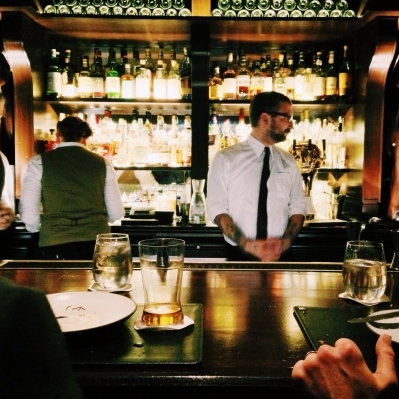Oregon Case Law Update: Court of Appeals Provides Insight on the Complicity Doctrine in Liquor Liability Suits
Court of Appeals Enforces the Complicity Doctrine in Liquor Liability Suits: Holds Passenger May Not Sue Bar Claiming Over Service to Driver From the Desk of Jeff Eberhard: Claims against bars, taverns and even social hosts come in several varieties, one of which occurs when an intoxicated driver is involved in an accident causing injuries to the passenger. But if the passenger played a role in the driver’s intoxication, will the passenger have a claim against the bar, tavern or social host for serving the intoxicated driver? Read on to find out.
Claims Pointer: A common factual scenario encountered by bar and tavern owners is where friends go together or meet at a bar, drink together and at the end of the night, leave together, with one of the intoxicated friends driving and the other riding as a passenger. In cases where the passenger is injured while traveling with the intoxicated driver and the injured passenger brings a claim against the bar or tavern, Oregon’s Liquor Liability Statute, ORS 471.565, requires the passenger to prove that they did not substantially contribute to the driver’s intoxication. Our firm represented the bar that served the alcohol. The trial court granted our summary judgment motion. The Oregon Court of Appeals found that the plaintiff failed to submit evidence to show that he did not substantially contribute to the driver’s intoxication, and confirmed that the trial court properly granted summary judgment in favor of our client.
Mason v. BCK Corporation, 292 Or App 580 (2018).
Plaintiff Mathew Mason (“Plaintiff”) was at BCK Corporation dba Duffy’s Irish Pub (“Duffy’s Irish Pub”) when he ran into a family friend, Jolene Mullenix (“Mullenix”). Mullenix was with her fiancé, Hidaro, and the three of them bought drinks for each other, staying at Duffy’s Irish Pub from 9:00 p.m. until about 2:00 a.m. During the course of the night, they consumed multiple rounds of drinks– perhaps as many as 10 each. There was evidence that Plaintiff may have purchased between one and three beers for Mullenix. Afterward, Mullenix gave Plaintiff a ride home, and while driving, she lost control of her car and struck a tree. As a result of the accident, Plaintiff suffered serious injuries.
Plaintiff brought suit against Duffy’s Irish Pub for serving Mullenix while she was visibly intoxicated. Duffy’s Irish Pub moved for summary judgment, arguing in essence that Plaintiff was complicit in Mullenix’s intoxication. The trial court agreed and dismissed Plaintiff’s claims against Duffy’s Irish Pub. Plaintiff appealed.
The Oregon Court of Appeals first considered the proper standard when determining if Duffy’s Irish Pub was entitled to summary judgment. Duffy’s Irish Pub argued that consistent with the “federalized” approach, the court must view evidence “presented through the prism of the substantive evidentiary burden.” In this case, under Oregon’s Liquor Liability Statute, ORS 471.565, Plaintiff must prove he did not substantially contribute to Mullenix’s intoxication by a clear and convincing standard at trial. Duffy’s Irish Pub thus argued the court should use the clear and convincing standard in its summary judgment analysis. The Court of Appeals disagreed, concluding that Oregon courts did not adopt the federalized approach. Accordingly, for purposes of summary judgment, Plaintiff only needed to offer “some evidence” sufficient to show a genuine dispute of material fact. (We continue to believe the Oregon legislature intended to “federalize” the summary judgment standard and will pursue this if the Oregon Supreme Court accepts review).
Liquor Liability Statute
The court next looked to the language of ORS 471.565(2), which required Plaintiff to show by clear and convincing evidence that he did not substantially contribute to Mullenix’s intoxication by:
(A) Providing or furnishing alcoholic beverages to the patron or guest;
(B) Encouraging the patron or guest to consume or purchase alcoholic beverages or in any other manner; or
(C) Facilitating the consumption of alcoholic beverages by the patron or guest in any manner.
(emphasis added). Plaintiff argued that the three subparagraphs would not bar his claim “unless that conduct actually played a role in the intoxication.” (emphasis added). In contrast, Duffy’s Irish Pub argued that the three subparagraphs provided examples of ways Plaintiff could “substantially contribute” – meaning that any providing, any encouraging, or any facilitating “not only contributes but substantially contributes so as to bar a plaintiff’s claim under ORS 471.565(2)(b).” After looking to the definition of “substantial” and “contribution” and the legislative history underlying the statute, the court determined “that the legislature intended the term ‘substantially contribute’ to mean conduct that was a significant and material cause of the intoxication * * * * as opposed to a factor that a reasonable person would regard as insignificant.” (emphasis added).
With that in mind, the court looked to decipher the meaning of providing or furnishing alcohol, set out in subparagraph (A). The court defined “provide” as “to equip,” or “to supply for use.” Furnish was defined as “to provide or supply.” The court noted that both terms were generally synonymous. According to the court, under subparagraph (A), Plaintiff “substantially contributed” if he “directly or indirectly supplied alcoholic beverages to the patron or intoxicated person, whether by sale or gift, and that act was a significant and material factor in the patron or guest’s intoxication.”
The court next looked to subparagraph (B). According to the court, “encourage” is defined as “to spur on,” to “incite,” or “instilling with courage, confidence, and purpose or fostering enough of these characteristics by advice, inducement, or similar influence to perform or endure as indicated.” The court stated that the phrase “or in any other manner” signified an expansive view, which the court noted is not only consistent with the “broadly worded text of the statute,” but with its legislative history. The court’s review of the legislative history of the Liquor Liability Statute included testimony and exhibits submitted with the bill, which focused heavily on other jurisdictions that adopted the complicity doctrine to bar recovery where plaintiffs drank alcohol with the intoxicated patron. Accordingly, the court determined that under subparagraph (B), Plaintiff “substantially contributed” if he “engaged in conduct that encouraged the patron or guest to purchase alcoholic beverages, drink alcoholic beverages, or otherwise engage in drinking activities, such as drinking with the person or ‘bar hopping.’”
Lastly, the court looked to subparagraph (C), and defined the term “facilitate” as “to make easier or less difficult,” “to lessen the labor of,” or assist, and aid. The court looked to criminal case law to find this answer, which provided that the word “aid” implied an “intent to facilitate an outcome.” The court interpreted the criminal case law to suggest that “facilitate” suggests acting with an intent to facilitate an outcome. The court did not use any legislative history to illuminate the legislative’s use of “facilitate.” Nevertheless, relying on criminal case law, the court concluded that under subparagraph (C), Plaintiff “substantially contributed” if he knowingly engaged in conduct that made it easier for the intoxicated person to consume alcoholic beverages. One example offered by the court is going to the bar and retrieving drinks for the person that later causes injuries to the plaintiff.
The court then applied its analysis to the facts of the case, noting that Plaintiff bought between four and five rounds of drinks for the group, and between one and three beers for Mullenix. Plaintiff acknowledged that he and Mullenix were drinking and socializing at Duffy’s Irish Pub from 9:00 p.m. to 2:00 a.m. Evidence showed that at the end of the night, Mullenix’s body alcohol content was at .205%. Much like the lower court, the Court of Appeals did not determine if “providing” under subparagraph (A) applied. However, according to the court, Plaintiff’s conduct, “depending on the other surrounding circumstances at the bar could have encouraged or facilitated Mullenix’s intoxication within the meaning of subparagraphs (B) and (C).” (emphasis added).
Plaintiff argued that there was a lack of evidence to show that he either encouraged or facilitated to Mullenix’s intoxication. The court, however, pointed out that the statute imposes a burden on Plaintiff to prove a lack of encouragement or facilitation. According to the court, the evidence must “allow a nonspeculative finding that the plaintiff’s conduct did not substantially contribute to the patron or guest’s intoxication.” Because Plaintiff offered no such evidence, the Court of Appeals upheld the trial court’s dismissal of Plaintiff’s claim.
To email Jeff Eberhard, please click here.
To view the latest Washington Case Law Update: Bar Owner Brings Suit against Police Alleging Harassment of Patrons and Staff, please click here.

















